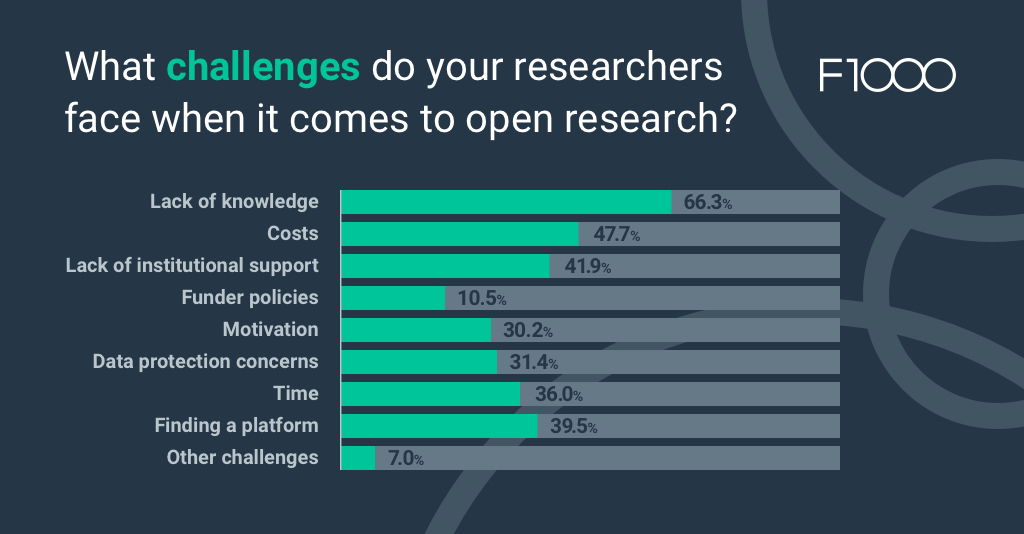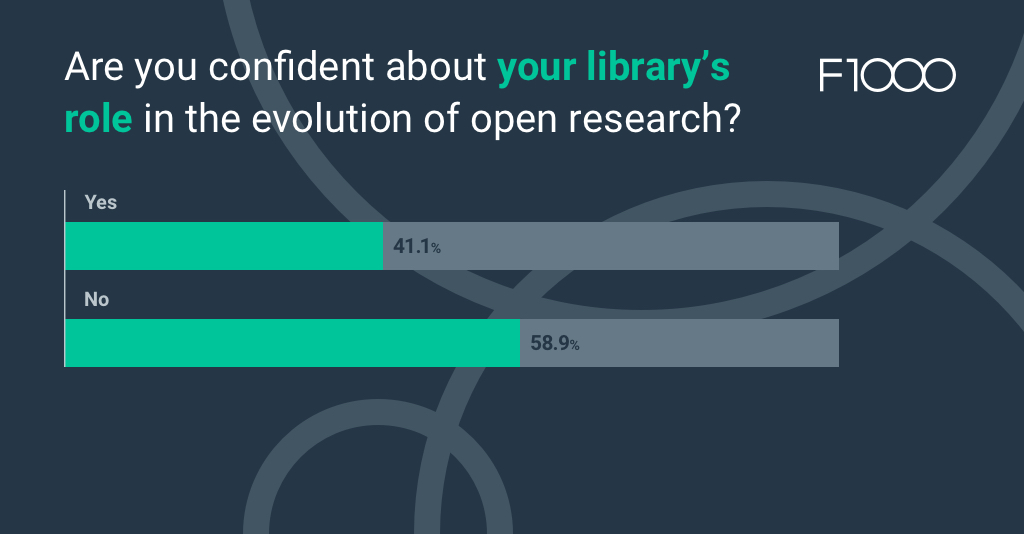
How can librarians support open research?
Discover 3 simple ways in this blog post.
The role of librarians in the open research landscape is changing, partly because of the increase of policies encouraging open research practices.
Open research prioritizes openness, transparency, and collaboration throughout the research cycle. But as researchers are required to navigate the increasing policies and funder requirements (to make their research open), they often need more support.
This is where their institutions and librarians can make a real difference – but how? In this blog post we cover 3 simple ways that librarians can support open research at their institution.
This post features poll results from a recent panel discussion with Joseph Lerro, Dr. Vitaly Citovsky, Mona Ramonetti, and Dr. Lisa Federer. This discussion was part of a recent webinar we ran in partnership with Library Journal.
For further learning you can watch the full webinar ‘The Role of Publishers and Libraries in the Evolution of Open Research’ on demand.
1. Seek out resources to build knowledge at your institution

Researchers face various challenges whilst trying to meet funder requirements, when making their research open. Some of these challenges come from a lack of knowledge about open research processes, as our poll indicates. Fortunately, this is where researchers’ institutional librarians can help.
Librarians have the opportunity to build their faculty’s knowledge around open research practices and processes. A useful place to start is by finding concise resources, and sharing these with researchers. This will also help you to grow your own knowledge of open research as a librarian.
In our webinar, the panelists discussed how (in the last few years) researchers are increasingly turning to their library for support. The requests for support include tools and workshops to assist with data management, funder requirements, and best practices.
To meet this demand, libraries could:
- Build a bank of open research information
- Have an available list of educational content for their faculty
- In the long term, create custom institutional guides on open research topics
To help get you started
Take a look at our wide range of free resources that include practical advice on making research open.
Resources to grow your knowledge
Download your free F1000 Open Research Toolkit, which includes the following three informative resources:
- White paper: Exploring the role of research development in research integrity
- Case study: Enabling the Bill & Melinda Gates Foundation to solve the challenges of the 21st century
- Institutional guidebook: Open research publishing solutions for research organizations and funders
Resources to share with your faculty
- An Open Data Toolkit, covering everything researchers need to know about FAIR data, Data Availability Statements, repositories, and more
- A concise summary of open data in the humanities
- Guidance on open peer review and how it works in practice
- We also host monthly webinars on different open research topics tailored to the needs of researchers. All previous webinars are available to watch on demand
Interested in how other institutional libraries are approaching open access in the Social Sciences and Humanities (SSH)? Read the librarian interview discussing open access in SSH.
2. Advocate the benefits of open research, and the need for practical support for researchers

Often, a lack of institutional support and funds can negatively affect researchers when they are publishing open research.
Librarians have an important role in encouraging their institution to make open research a priority, and deliver practical support to their researchers.
Our webinar panelists discussed how researchers are increasingly asking librarians for assistance to meet funder mandates, and are asking more questions about the openness of research and the barriers of paywalls.
As a librarian you should be prepared to advocate for your institution’s demand for open research and highlight its many benefits. This will help build researchers’ confidence in their institutions’ evolution of open research.
Some benefits of open research
- Open research supports research transparency and reproducibility.
- Research that is shared openly can be built upon quickly by other researchers; this has been important in accelerating the pace of COVID-19 research. This means that open research allows institutions to maximize their investment into data collection and research.
- Enabling research to be published so that it is accessible to anyone, anywhere, democratizes information, and boosts public understanding of institutional research. This also increases trust in research findings.
To help make these benefits a reality, you will need to understand the challenges researchers are facing, and advocate for your institution to support them.
As part of this work, you will need your institution to recognize that researchers require support to make their work widely accessible, all whilst still protecting the integrity of their research. Researchers need access to institutional infrastructure to share their work safely, and they may need increased funding to pay open access publishing fees.
3. Find innovative solutions to help your institution embrace open research publishing practices
To help researchers publish openly and share data more easily, librarians could work with them to understand their specific barriers. It could also be useful to collaborate with other faculties to understand if their researchers are facing the same challenges. Doing this could help find the right solutions for your researchers’ needs, and even expand their open research publishing options.
One way this could be approached is by creating institutional platforms, such as a repository capable of hosting (and making open) data sets and other materials. These would be useful resources to share across faculties to drive open research at your institution.
However, it is important to remember there are a few limitations if you were to rely solely on repositories to support open research.
- They are often only accessible to staff at the institution, so there is a lack of opportunity to share contents with external researchers and the public to get their insights.
- Researchers may rely on librarians to upload their research outputs to a repository, meaning an increased workload for librarians.
- Many repositories are lacking in uploads of articles, chapters, and books, so librarians may need to seek an efficient institutional platform to protect their workload.
Librarians can also help their institutions to recognize, showcase, and reward high impact data sets which have been shared openly and reused by other researchers. Librarians who work with bibliometrics can help develop their institution’s understanding of the impact of their research and shared data, especially if more outputs across the research lifecycle are being openly published. This activity can encourage open research practices and help institutions incentivize open practices.
Open research solutions
You could also find open research publications and make them discoverable to your researchers. This includes highlighting venues to researchers where they may already be eligible to publish openly. F1000 powers many open research publishing Platforms supported by funders and organizations, so researchers affiliated with them can publish there for free.
Librarians could also work with publishing companies on affordable open research solutions tailored to their institution’s goals. For example, this could be a publishing venue that is either discounted or free to an institution’s researchers. F1000 partners with organizations all over the world to help them meet their open research goals and support their researchers. Institutions work with us to create:
- Platforms: Bespoke publishing venues for research communities, powered by F1000.
- Gateways: Branded research hubs for an organization’s content, on an F1000 Platform.
- Collections: Groups of Research Articles on a topic or area of interest, on an F1000 Platform.
- Content bundles, or institutional agreements: Where organizations pre-pay for their researchers’ future publications on an F1000 Platform.
Want to learn more about how you can support your institution’s researchers to publish openly?
Book a meeting with F1000 today to learn more about the open research publishing solutions available.
This blog post was originally posted on Taylor & Francis Librarian Resources on January 6, 2023.
